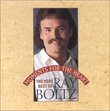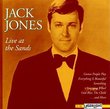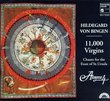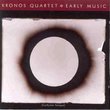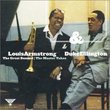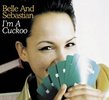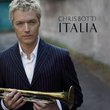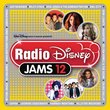| All Artists: Alfred Schnittke, Gennadi Rozhdestvensky, Oleg Kagan, Natalia Gutman, Yuri Bashmet Title: Schnittke: Concerto Grosso No. 2; Viola Concerto Members Wishing: 0 Total Copies: 0 Label: Moscow Studio Release Date: 9/7/2004 Genre: Classical Styles: Chamber Music, Forms & Genres, Concertos, Historical Periods, Classical (c.1770-1830), Instruments, Strings Number of Discs: 1 SwapaCD Credits: 1 UPC: 723724694422 |
Search - Alfred Schnittke, Gennadi Rozhdestvensky, Oleg Kagan :: Schnittke: Concerto Grosso No. 2; Viola Concerto
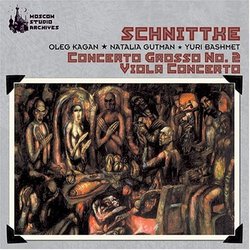 | Alfred Schnittke, Gennadi Rozhdestvensky, Oleg Kagan Schnittke: Concerto Grosso No. 2; Viola Concerto Genre: Classical
The term "authentic performance" is tossed around loosely these days, but here is a historic recording as "original" and "authentic" as has ever been produced. The Concerto Grosso No. 2 was composed by Alfred Schnittke exp... more » |
Larger Image |
CD DetailsSynopsis
Album Description The term "authentic performance" is tossed around loosely these days, but here is a historic recording as "original" and "authentic" as has ever been produced. The Concerto Grosso No. 2 was composed by Alfred Schnittke expressly for violinist Oleg Kagan and his wife, cellist Natalia Gutman, who are the soloists here. The Viola Concerto was written by Schnittke for violist Yuri Bashment, who performs it here. These works are representative examples of Schnittke's "polystylism," scored for conventional orchestra augmented by electric guitar, drum kit, brake drum and other instruments not usually heard in "classical" music. Similarly Requested CDs
|
CD ReviewsTwo 1980s "polystylism" pieces in truly definitive performan Christopher Culver | 08/20/2005 (5 out of 5 stars) "This disc, part of the Moscow Studio Archives series of groundbreaking Soviet performances, collects two works by the late Alfred Schnittke, his Second Concerto Grosso for violin, cello, and orchestra, and the Viola Concerto. They are performed by the dedicatees themselves with the USSR Ministry of Culture Symphony Orchestra conducted by Gennady Rozhdestvensky. In the early 1980s, Schnittke was exploring a style he called "polystylism", a Russian answer to postmodernism in which modern elements mingle effortlessly with quotations from the works of centuries past. The works here serve as fit examples of this intriguing method of composition. The "Concerto Grosso No. 2" for violin, cello, and orchestra was written for the Soviet dynamic duo of violinist Oleg Kagan and his wife the cellist Natalie Gutman, a legendary partnership that ended with Kagan's untimely death. Schnittke's first concerto grosso was a stately and serious piece in which a distinctly modern tone was occasionally invaded by quotation from baroque works. This second concerto grosso, on the other hand, is comical. The violin begans by playing the well-known tune "Silent Night" before the orchestra brashly interrupts with a quotation from Bach's Sixth Brandenburg Concerto. The work then becomes positively zany as electric guitar and a rock drum kit join in the performance of the Handel quotation. Over the first movement, tension is built by pairing baroque writing and more Handel quotations against menacing modern moments. In the second movement, "Silent Night" returns, but it becomes ever more obvious that orchestral forces are out to stop the tune from reaching the listener. In the third movement, the Brandenburg quotation waltzes triumphantly over the scene, but eventually collapses under its own weight, letting "Silent Night" return at the end without impediment. This performance by the work's dedicatees is certainly much better than a recent one on Chandos with Gridenko and Ivashkin, which is unlistenable in comparison. The "Viola Concerto" was written in 1985 especially for Yuri Bashmet, the most renown violist of the 1980s and 1990s, and one credited with the rebirth of writing for the instrument. The concerto is in a standard three movements, but is noteworthy for using no violins, which lends a poignant tone to the work, which must depend on low strings. The opening movement is sorrowful, with an opening motive based on Bashmet's name. The middle movement is quintessential Schnittke, a blend of colours and styles (waltzes, military marches, elegies, romantic tearjeakers) that are incongruent yet strangely complementary to each other. However, the viola is battered by the many orchestral forces, and in the long, drawn-out last movement he slowly expires as from a mortal wound.The Viola Concerto is a downer, a piece that charts Schnittke's fascination with pain and death as well as anything else he wrote in the last fifteen years of his life. This piece is not as immediately entertaining as the concerto grosso, but in the end is perhaps superior. All in all this is an exceptional disc and a wonderfully economic purchase. It may also serve as an important document of art under Communism, as the soloists are continually beaten up by great impersonal forces. If you've never heard the work of Alfred Schnittke before, pick this up as a fine introduction, although the Deutsche Grammaphon disc (part of the "Echo 20/21" series) with Gidon Kremer playing in two other concerti grossi is a good buy as well." Fantastic performances of two Schnittke works for strings R. Hutchinson | a world ruled by fossil fuels and fossil minds | 06/11/2005 (5 out of 5 stars) "This release in the valuable new Moscow Studio Archives series includes two superb performances, and the first recordings of both works -- the "Concerto Grosso No. 2" and the "Viola Concerto." Both are performed by their dedicatees, violinist Oleg Kagan and cellist Natalie Gutman, who were married, and violist Yuri Bashmet. Gennady Rozhdestvensky conducts the USSR Ministry of Culture Symphony Orchestra for both recordings, from 1986 and 1987. Like the CG1, the CG2 is full of wild, polystylistic elements, including electric guitar and drums playing funk rock and a reference to Bach's Fifth Brandenburg Concerto. The core contrast is the violin and cello playing Silent Night (the sacred), interrupted again and again by a barrage of loud, grotesque and quite profane outbursts from orchestra and percussion, until the quiet, worshipful melody finally reasserts itself in the end. While certainly not Schnittke's finest composition, Kagan and Gutman in this performance best capture the sacred standpoint against which all the other mayhem surges. The more recent recording by Ivashkin and Polyansky (paired with Schnittke's Symphony No. 6 -- see my review) is more superficial, as it fails to establish the ground against which the dizzying array of parodic figures is contrasted. The "Viola Concerto," written for Bashmet, is clearly one of Schnittke's finest works, lyrical melodrama at its best. Bashmet's performances from the beginning were wildly popular, and established his reputation as a world-class violist. He has recorded it again, as has Kim Kashkashian, and I haven't heard any of the alternative performances, but this one, the first, is powerful and moving. This disc is absolutely superb, essential for Schnittke devotees and highly recommended to anyone coming to his music for the first time!" Striking Jascha Oakes | Australia | 12/10/2006 (5 out of 5 stars) "I am new to Schnittke and I bought this album really out of curiosity. His music is unique and has to be heard as it contains some of the most strikingly beautiful melodies I have ever stumbled across. The quality of audio is also top class..."
|

 Track Listings (7) - Disc #1
Track Listings (7) - Disc #1